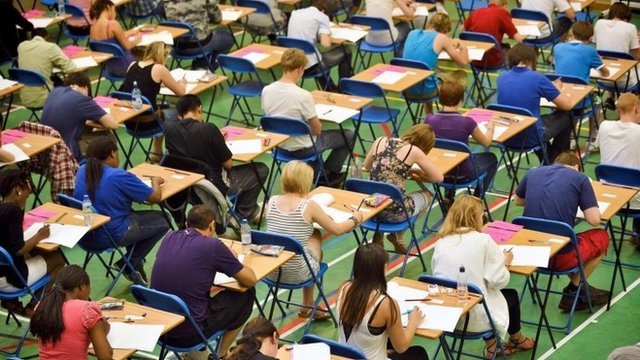Went the day well?
After years of August centring around exam results for one or other of my own children (with three of them having done GCSE, AS and A2 we had eight years on the trot of that) it’s now easier to be more dispassionate about it. Twelve years as a subject leader was enough of the agenda being set by a fateful August Thursday.

So what emerged on this fair morn? Last year, of course, had seen a hiccup in the previously steady upward trend. To be fair, there had been warnings before from Ofqual but one always hopes that it will have come right for one’s own students. Core science in particular took a hit in 2013. It didn’t seem likely that the trend would continue further down this year, but it might have rather undermined the rhetoric about tightening up the system if it had all gone back.
However, there were other changes afoot. The move to terminal assessment and the changing of regulations relating to resits led to significant changes in entries by schools. Regarding Core Science, students are now being entered later and there’s more emphasis upon schools being confident of outcomes rather than using resits as a safety belt.
The results told their own story. Core Science came up six percentage points on A*-C against last year and is now at 59.1%, though is lower than the 2012 figure of 60.7%. Girls do better than boys (five and a half point gap). The entry is down by 20%, which could be explained by fewer Year 10s being entered.
Additional Science also came up though by a more modest one and a half point increase to 65.5% A*-C. Entry was up by 14% and girls had a similar lead. The entry figure suggests a reversal of the previous trend of students going for Triple Science rather than Core + Additional. If we focus on the increase in Additional entry and put the drop in Core down to entry in this being deferred until Year 11 it indicates that the model of students studying these and doing all the exams at the end is becoming more attractive. The outcomes suggest that students are benefitting from this in terms of grades but it also seems plausible that this makes Triple Science, with its plethora of exams, less attractive, especially if the same students are doing a series of challenging exams in other ‘academic’ subjects as part of their Ebacc suite.
So, what’s the story in Triple? A gentle rise in A*-C, up by half a point in all three sciences, and a drop at A* of a point in Biology and Physics and of two points in Chemistry. The gender gap is narrowing slightly, with girls being ahead at A*-C by one and a half points (instead of two and a half) in Biology, by two and a half (instead of three) in Chemistry, though still half a point ahead in Physics. Entry, however, is down significantly, by 19% in Biology, 17% in Chemistry and 15% in Physics, the lowest since 2010.
This can be seen as a direct result of changing government policy. Students are more likely to do all their exams at the end of Year 11 and seem to be performing better on the Core + Additional route. They are less likely to be doing Triple Science (despite government targets), possibly because to achieve good performance across a set of Ebacc subjects all being examined at the end they are focusing upon two sciences rather than three. As we move towards a dual award combined (and end-examined) science GCSE starting 2016 this puts many schools in a good place. It does mean that this course needs to be well prepared as it’s likely to be a popular route.
Ed Walsh
Ed is the series editor for the Collins Key Stage 3 Science First and Second Editions and has contributed to or edited over 30 books.


